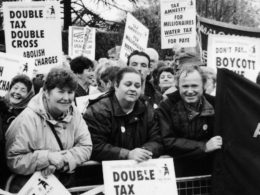The rejection by public sector workers of the proposals in the Croke Park 2 agreement that would further savage their incomes and conditions is hugely significant in that it demonstrates that people’s tolerance to austerity is running out fast and that has very serious political implications for the government.
The revolt by low and middle income workers in the public sector comes days after thousands marched through the streets of Dublin in opposition to the property tax in a demonstration that also marked a hardening of attitudes among the victims of the austerity agenda. There was evident a stubborn determination not to be intimidated by threats of deduction of the home tax from wages and pensions and to mount a nationwide boycott of this new burden along with strong political pressure to force its abolition.
In relation to Croke Park 2 and the property tax, the government now faces the most open challenge yet to its policy of continuing to transfer the bad debts of bankers and developers onto the shoulders of working class people. It’s not clear if the leaders of Fine Gael and Labour appreciate fully that attitudes have changed whereby an angry and grudging tolerance of their continuation of Fianna Fail austerity is now going over to active opposition.
Certainly when pressed in the Dail on Wednesday as word came through of the trade union rebuff to his government’s proposals, the Taoiseach stepped back from the macho posture struck by Minister for Public Expenditure Howlin when he threatened legislation for a 7% wage cut across the board for all public workers if they didn’t toe the Croke Park line. Tánaiste and Labour Party Leader Eamon Gilmore was equally reticent. No doubt the thought of trying to whip frightened Labour backbenchers into the lobbies to vote for wage cuts, including for workers on a third of the salary of Dail deputies, gave pause for reflection. With thoughts of their rout in the Meath East Bye election still raw, Labour would surely shed several more members of its parliamentary party if he took that course.
This Coalition is in an economic dead end. That was made very clear when the former IMF head of mission to Ireland disowned the current austerity policy as ‘untenable.’ With the domestic economy ransacked by cuts in workers’ and households’ incomes, there is no significant growth in view that could seriously dent unemployment and make the debt situation more sustainable. That is why the government is desperate for more wages cuts rather than being in a position to depend on buoyancy in taxes arising from a growing economy.
There is ample scope for tax increases on the 5% of highest earners in the State, on tax avoiding major corporations and on major financial transactions. Fine Gael will never tolerate the very wealthy being made to pay up in that way, nor will a gutless Labour Party insist.
The government should take warning, however, that the limits of austerity have been reached by very many. A pensioner’s letter to the Irish Times on Tuesday should be required reading for every government Minister and deputy. Tim O’Neill recounts filing on line the return for the property tax the same day he received it, expecting the money would not be deducted until July 21. It was taken immediately which led him to unleash a rhetorical broadside; ‘Why Why should I go on being an honest taxpayer, coughing up hard-earned money for more than 40 years of my working life, paying every cent . . . in income tax and PRSI and VAT and Dirt and youth levies and health levies and all the other taxes and levies and deductions, and now this house tax and the water tax next, in order to pay for the mistakes of corrupt politicians, greedy bankers and golden circle who have scammed us since so-called ”? . . . Why? Why? Why? If ageing, middle-class, quiescent, blameless citizens like me, who have never scammed a penny nor hidden a single nixer from the taxman, can get as deeply angry as I am right now at this final straw, then what hope is there . . ?’
Trade union leaders who recommended the Croke Park cuts to their members and who also – incredibly – support the home tax, should also take heed. There is a groundswell of anger that cries out for an alternative. It can be actively organised to bring austerity to a shuddering halt and force a change of policy. That is the very concrete challenge now facing the campaigns against the home taxes and which also calls for a movement from below to refashion the trade unions as vehicles that really fight for the interests of working people, the unemployed and the poor rather than as support bases for a creaking and discredited Labour Party.












